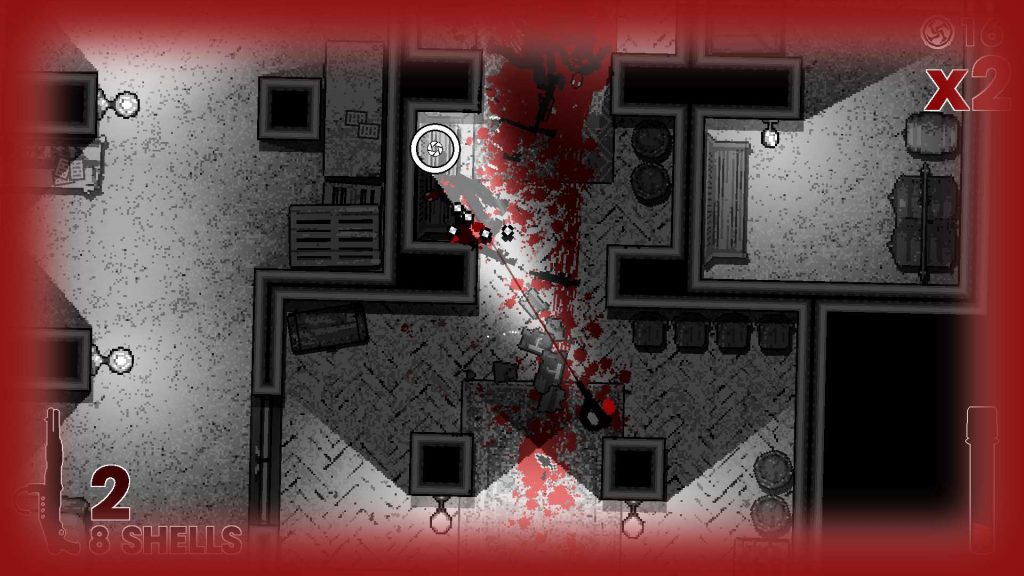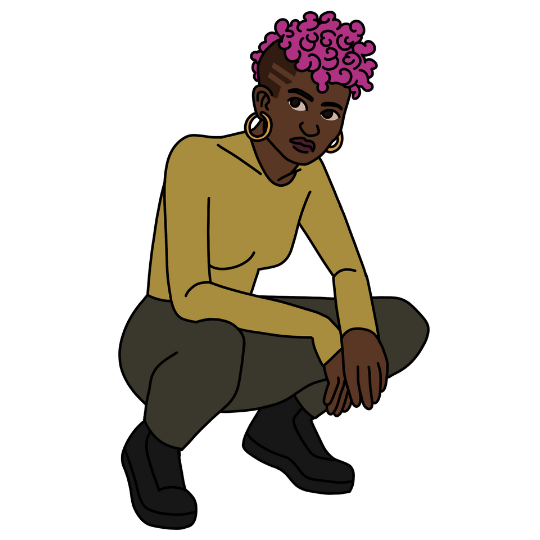A violent allegory of depression: an interview about OTXO
Posted: 31 Mar 2023We had the chance to interview Nate Haddock, developer of OTXO, about how he created a game depicting his own struggles with depression.
The Interview
Rosie [R]: Can you tell us about OTXO and what it’s about?
Nate [N]: Basically it’s about this guy who at random finds this cursed mask, and is compelled to put it on. This transfers him and his loved one to this mansion where she is trapped within the mansion, and he must make his way through rooms of enemies to rescue her. There’s more to it of course, but I’ll get into how it links to mental health shortly!
R: I guess it’s supposed to be deliberately a bit ominous and mysterious, right?
N: Exactly, exactly.
R: What prompted you to make OTXO as a game in general?
N: I like mechanically tight games, which is what I wanted to do with OTXO, but for the concept of the storyline; I wanted to make a game that was specifically about my thoughts and experience with depression. Obviously it’s different for everyone, it’s a very subjective thing, but for me depression is very much a battle. I wanted to take that… anger [anger’s maybe not the right word], of having to deal with something like this and focusing into the experience, which is why the game is so outwardly violent.
R: On the surface it doesn’t seem like it would be related to depression because it seems quite brutal and violent – why did you go down the route of literal violence in the game?
N: I think it’s the most cathartic way to deal with something like that! When I have to deal with my depression it’s like a constant fight. It feels so taxing. You have to put in so much energy to deal with it – it’s truly constant battling. And it’s like the anger that I mentioned before – it’s anger at the depression itself. At the concept of it – they just fit to me.

R: A lot of people of people often make games about subjects like these as a way to process them internally and use development as a cathartic way to handle trauma in a way. Do you think that was part of the reason that you made OTXO as a way to physically embody and immortalise how you were feeling at the time? When you play the game, do you think it’s a way to help you when you’re feeling low?
N: To the first part of that question – probably not really! Making the game itself wasn’t really cathartic for me in that way but in some ways it was easier to make it because it was something I experienced. But it hasn’t really helped! That’s what counselling is for. By virtue of being a roguelike, the game is a repetitive loop with the overall message of ‘don’t give up’. As you get further in, you are becoming stronger and getting more skills, and you as a player are getting better at playing the game, just like you as a human being can be getting better at dealing with depression. So the overall message is ‘don’t give up’.
R: I like that. I think a lot of the time when people know a game is about mental health, they expect it to be a certain way. When you say mental health game, people often assume it’s really cosy and nice, and is super relaxing. It’s nice to see other narratives play out in genres that you wouldn’t typically expect within games! It’s good to challenge the assumption around mental health themed games being different, and having that personal touch to what the player wants from it.
N: You know how the matrix movies are about being trans, but it’s not so outwardly about that? I wanted that kind of like subtle touch to the game; like the game is about depression but it’s not going to beat you over the head with it. I wanted it to be subtle.
R: Exactly, and that’s got nice symmetry with people as well in a way. They might be depressed, but they’re still a person. It’s still a game, it might have themes within it but it doesn’t change the fact that it’s a game that’s meant to be enjoyed, regardless of how you connect with the inner meanings of it.

You said the main message within the game is about not giving up; are there any other take-homes that you’d want players to have?
N: Don’t give up is the main one I think of. When I accepted the fact that I have depression, I thought it’s going to be something that’s going to be consistent in my life. Obviously it ebbs and flows, but I don’t see it ever really going away because that is the way that it is. With that in mind, not giving up was probably the most important message I could put in the game. You have to keep pushing forward. You have to keep going.
R: Does having depression have an influence on how you make games? I’m sure there are a lot of other developers who might be experiencing mental ill health for the first time, with effects on productivity and drive. It can be very easy in that situation to feel guilt or place blame on yourself. Do you have any words of wisdom that you’d want to share with someone going through a similar thing?
N: First of all – take breaks. Take breaks before you feel like you need a break.
When you feel like you need a break and then take a break, that’s where the guilt can sometimes come in. It’s a lot easier to take a break when it’s like “hey! I’m taking a break right now. Not because I’m useless but just because I’m taking a break.”
It feels a lot better that way. It also helps to separate yourself from the project a little bit too. It helps if you view it as ‘work’ rather than ‘this is a core part of who I am’. I feel that a little bit – I think you have to a bit to make games, but it can’t be your sole motivation because if it goes south, you are going to feel terrible about yourself. It really helps to separate yourself from your work – see it as something you have to do rather than ‘this is the most important thing’.
Get some sleep. That’s always a good one! Drink a lot of water, have a good diet, exercise if you can. Those are all big.
Anni [A]: Drink some water, as Rosie drinks some Pepsi Max
R: Don’t expose me like this! I’m a beverage goblin I’ve been told – I have one for energy [holds up coffee mug], one for hydration [holds up water bottle] and one for fun! [holds up Pepsi Max].
[We continue to talk about water bottles for a little while]
N: Go on walks! That’s an easy way to exercise and clear your mind – go on walks.
R: I like those because they’re not really difficult things to do either – they can feel difficult to do don’t get me wrong, but it’s genuinely amazed me when I’ve been in a low place and gone to the shops, come home and been like “I’m having such a good day now?! What’s happening?!”
It doesn’t always work, but if there’s a chance of that happening and it’s going to change your mood, why not give it a go.
N: Apparently there’s some science to it, where if you change your environment it can have a substantial effect on your brain chemistry in the moment. It’s always super interesting because sometimes I don’t buy it, and then I go outside and I feel better, and I’m like ‘huh’.
R: It’s so annoying as well because it’s all of the people who tell you going on a walk will fix your depression. It didn’t fix it but it did make me feel better and I’m kinda mad about it.

I have one final question! How did it feel developing OTXO compared to developing Dogworld because of the meanings within the game?
N: It was different for sure. When I was working on Dogworld I was pretty horribly depressed. I was living in a town where I didn’t really have any friends, working a desk job I didn’t like. Dogworld’s general tone is more about loneliness and feels darker in my mind even though it’s not presented that way. When I was working on OTXO, I was surrounded by people who love me, and I was working a job I like, and I feel like I was able to focus more on the granularity of depression itself rather than general ‘I’m kinda lonely, everything sucks’ kind of feelings.
R: I really resonate with that – obviously I’ve not made a game, but it’s so easy when you go back to what you were feeling at the time of making/writing something and that’s how you view it in retrospect rather than what the material is. I recently wrote up a story for the website and I was pretty ok? It was about one of the darkest periods of my life but because I am in a pretty good place now in comparison, I was like ‘yeah, it’s good. I’m alright. Even though this has caused me years of trauma, I’m okay.’ It’s strange how your current mindset can affect associations with projects like that.
Enter the Mansion when OTXO releases on Steam on April 20th.

